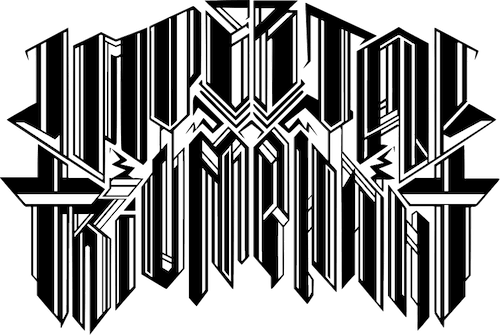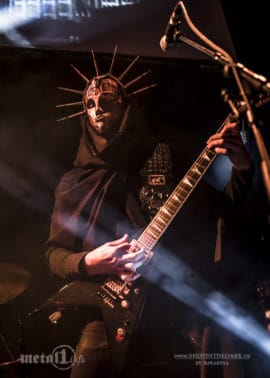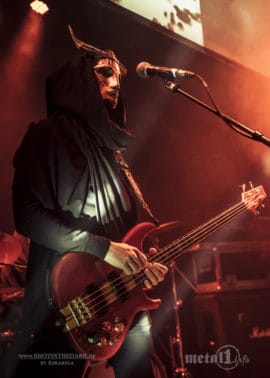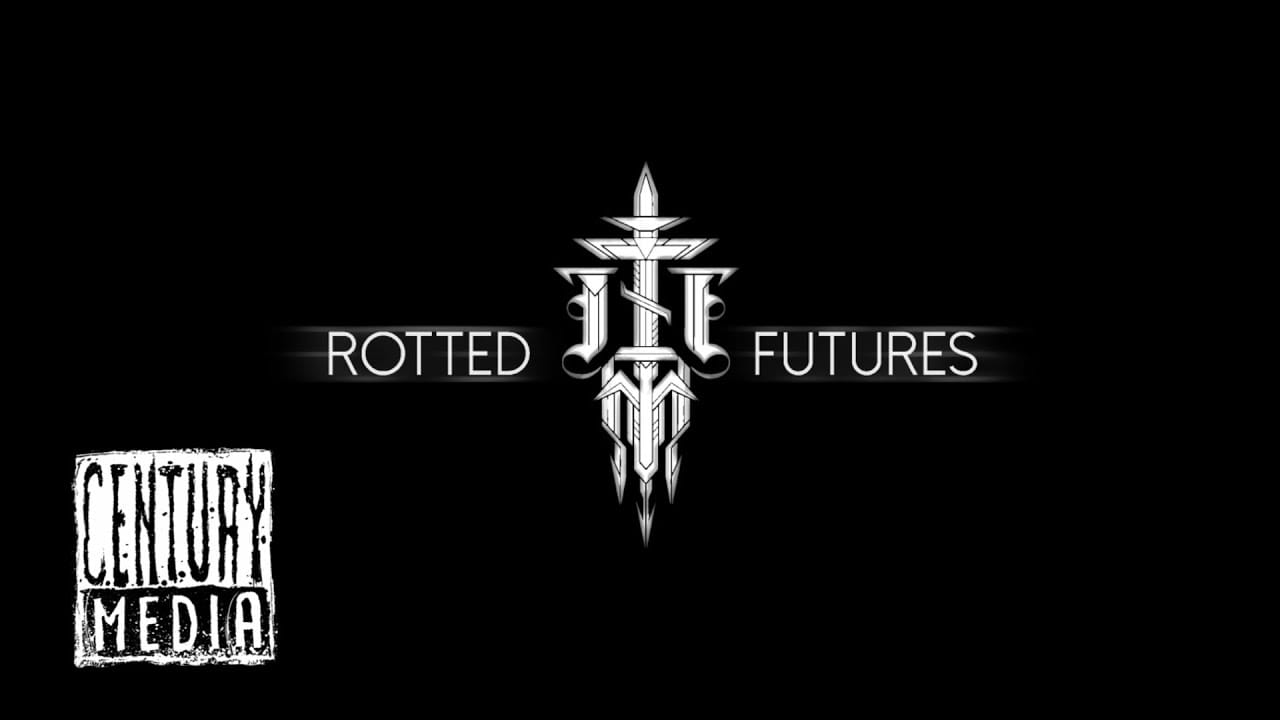On their breakthrough album „Vile Luxury“ (2018), IMPERIAL TRIUMPHANT set the dazzling abysses of their hometown New York to music like no other band before them. On „Alphaville“, the group has now further refined their unique blend of monstrous extreme metal and decadent jazz, creating yet another spectacular image of a machine-like megacity – the perfect occasion for us to ask the band a few questions. The result is a conversation about the Chrysler Building, the neo-noir film after which their new album is titled, barbershop singing, and looking beyond the proverbial horizon.

First the question that probably opens every interview at the moment: How are you coping with the current situation around COVID-19?
We are navigating as best we can. It’s a challenging global disruption, to say the least. There is no telling what will unfold.
In your music and your aesthetics you depict the contrast between luxury and its internal ugliness which manifests itself most apparently through severe poverty, within the context of mega cities like your home New York City. What drove you to illustrate these social conditions in your art?
We are from New York and so observing the place you spend the majority of your existence in seems natural. Like many control centers throughout history, there are many variables that make up the diverse fabric of such places. It is not up to us to arrogantly explain the how or why; Rather, we choose to focus our lens on the big picture of this unpredictable human life, and societal effects thereof.
Is your work to be understood as a rejection of decadence – or is there also a certain admiration for opulence to be found in it?
It would be wrong to say that we reject luxurious aspects of civilization as there are many great visions. Style, aesthetics, design, taste, lofty works, etc… are all good things. I cannot look at the Chrysler building and say that it’s shit because there is poverty in the world. That would be a foolish sentiment. However, there also exists much evil that has shaped the confines of this civilization and continues to do so. Nature itself is cruel and ruthless.
 Listening to your music, I personally imagine scenes like mindlessly busy crowds, derailing trains and collapsing skyscrapers. Do you consciously create your music with such images in mind or with the aim of conveying such images to the listener?
Listening to your music, I personally imagine scenes like mindlessly busy crowds, derailing trains and collapsing skyscrapers. Do you consciously create your music with such images in mind or with the aim of conveying such images to the listener?
Music itself has no images or ideas beyond what the listener imagines. Adding lyrics to the mix can tie energies together that may have been connected to a piece of music’s inspirational origin. We always set out to create music that we enjoy and are excited by. The response from our listeners has been awesome, and that is a great thing!
Your music often sounds so extreme, raw and inharmonious that a casual music listener might think that you simply play your instruments wrong. How difficult is it to realize such a sound in an intentional way?
It is not up to us how a listener interprets our music. Obviously we know how to play our instruments with many years of hard work put into it. The expression that comes out is the culmination of those years, life experiences, and individual personal taste that then comes together as a trio. Almost everything that goes into our work is deliberate, as we strive to create a rich listener experience. We are lucky to agree on so many levels artistically that although it may take us two years to make an album, it’s time well spent in this fucked up life.
Art like yours or genres like outsider music challenge the general ideas of what is right or wrong, good or bad sounding. Can there even be any objectivity in this respect from your point of view?
Most likely not as we are deep in the work we create, are fans of, or get inspired by. We only know what is right to us. If it gets people to go beyond the box of their own confines then that’s a positive shift, don’t you think?
Your previous album „Vile Luxury“ was a real game-changer and it got you a lot of attention. Your new album „Alphaville“ seems to be a further refinement of your style rather than a big change of style. Would you say you have found your very own sound now?
Well the sound of a band is going to take shape after playing together for many years. There is no other way to have one. There are no short cuts. Although our sound will be more familiar to listeners since it’s established now, we’ll continue to evolve. At least you must try!
Did you feel a certain pressure on you because of the high expectations that people had after „Vile Luxury“?
Sure, there’s always a bit of pressure after you make an album you’re proud of. But, then you get inspired to create again and just go forward. You never know what the outcome will be exactly. That’s an exciting part of the creative process.
 I assume that the title „Alphaville“ refers to the movie of the same name by Jean-Luc Goddard. While it’s about a futuristic dystopia, the movie has been around for quite a while. Do you think it has less or possibly even more relevance today than it did back then?
I assume that the title „Alphaville“ refers to the movie of the same name by Jean-Luc Goddard. While it’s about a futuristic dystopia, the movie has been around for quite a while. Do you think it has less or possibly even more relevance today than it did back then?
Like much great art it has more relevance today. Just look around. Goddard’s great work is inspiring for its content, but also it’s artistic and technical style. The film is steeped with luxurious design, lofty images, and great taste. It’s put together with an almost “anything goes” kind of vibe, albeit carefully crafted. We admire that.
The increasingly grotesque „Atomic Age“ starts surprisingly with charming barbershop vocals. What was the idea behind this almost naive sounding intro?
The song, on a surface level, deals with 1950s post world war nuclear bomb testing. We wanted to take the listener back to that era by introducing the song with an old American close harmony vocal style of barbershop quartet.
On „City Swine“ there are even taiko drums played by Tomas Haake (Meshuggah). What made you decide to include this rather exotic instrument for a part in your otherwise primarily urban, western influenced sound?
The Japanese taiko drums are magnificent and we are all fans of the sound. There should be no boundaries in music.
You also worked with Yoshiko Ohara as a guest singer again. What is it about her voice and maybe also her personality that makes you so enthusiastic to work with her?
We shared a bill with her in Brooklyn around 2013 and were completely blown away by her performance. We discussed collaborating together and we’ve been including her voice in our work ever since. She’s a very talented singer and her voice has a unique timbre that has now become a staple of the band’s sound.
You also created two cover songs for tjri lbum: „Experiment“ by Voivod and „Happy Home“ by The Residents. Why do you think these two songs fit into the context of the album?
They are technically bonus tracks. We chose songs that we grew up loving. They’re not in our particular genre so it was a really enjoyable challenge to ‚imperialize‘ them and make them our own.
Ironically, your cover of „Experiment“ seems very straightforward compared to your own material. Do you think that at their respective times groundbreaking songs can wear out in the long run even considering their temporal context?
No. Voivod is a very forward thinking band, then and now. „Experiment“ is a complex tune in its own way. We just did what came natural and if it sounds „more straightforward“ then that was what’s meant to be.
 You recently apologized in a Facebook posting for praising albums of one or another ideologically questionable band in an article. What is your take on this – should such bands be strictly boycotted or can it still be legitimate to listen to and discuss their music under certain circumstances?
You recently apologized in a Facebook posting for praising albums of one or another ideologically questionable band in an article. What is your take on this – should such bands be strictly boycotted or can it still be legitimate to listen to and discuss their music under certain circumstances?
I think people should and will do whatever they want but of course it’s important to understand how things affect people.
The reactions to the posting were very much mixed – some fans thought it was admirable and sincere, others either didn’t see the problem at all or even claimed it was just a matter of image cultivation. Why do you think are the radical views of some bands accepted uncritically or played down by so many extreme metal fans?
See above answer.
What are your next plans for IMPERIAL TRIUMPHANT?
We have been working hard to stay busy. Looking into other platforms like scoring films, television and video games. We want to bring IMPERIAL TRIUMPHANT to as many different industries as possible.
On Metal1.info we like to end our interviews with a short brainstorming. What do you think about the following terms?
Alphaville (German synth-pop band): Another band inspired by the great work of Godard.
Conspiracy theories: To each their own.
Nature romanticism: Futurism
Favorite quarantine pastime: Exploring new cooking recipes.
Climate crisis: Dark
Most uninteresting music genre to you: Any genre can be interesting or not.
Dieses Interview wurde per E-Mail geführt.
Zur besseren Lesbarkeit wurden Smilies ersetzt.

